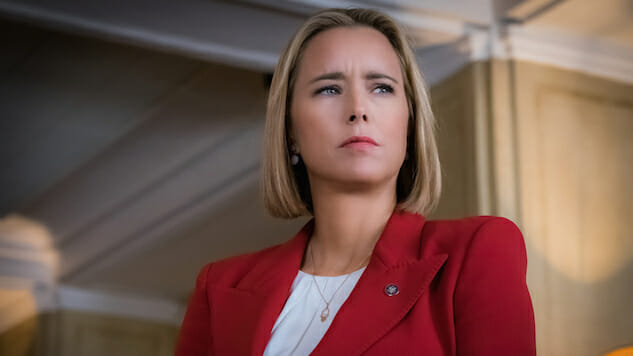Madam Secretary Is the Ultimate Form of Political Escapism
Photo: Jeff Neumann/CBS
In the new season of Madam Secretary, Secretary of State Elizabeth McCord (Téa Leoni) buys a handheld wet/dry vac for her college-bound daughter and assents to a meeting with a minister from Timor-Leste. She compares indistinguishable paint swatches with her husband, Henry (Tim Daly, the sexiest religious scholar since Matthew McConaughey in Contact), and decides to use a translator on a diplomatic mission to Libya—concerned, though she speaks Arabic, that her grasp of the dialect is not strong enough. She wears sensible blazers and stylish spectacles; she attends meetings, manages aides, tangles politely with the president, Conrad Dalton (Keith Carradine), and with his quick-tempered chief of staff, Russell Jackson (Zeljko Ivanek). That’s it, to be honest. Sure, there are crises to confront, both at home and abroad—extremists on the loose, Russians angling for influence; Arizona senators and cable news anchors marinating red meat for their respective constituents—but the defining feature of Madam Secretary is its almost fantastical calm. It’s a political procedural that nonetheless seems to be set on another planet, one that promises, like a billboard along the highway, “If you lived here, you’d be home by now.”
In this, the series, created by Barbara Hall (Judging Amy, Joan of Arcadia), is the ultimate form of escapism: Though it’s set in the same world, roughly speaking, as the press conferences and stump speeches that populate our screens the rest of the week, for one hour each Sunday, Madam Secretary transports us to a place of soluble problems. There are serial subplots—including, at the moment, a particularly tedious one involving a young Russian (Chris Petrovski) recruited by the CIA—but for the most part each episode introduces a conflict, complicates it, and then resolves it in time for a snack before bed.
Here is what happens in your average installment of Madam Secretary: There’s an American in peril, say, or a standoff with the Chinese (this writers’ room simply adores Americans in peril and standoffs with the Chinese). The American turns out to have been in Syria or Burma or Venezuela under not-so-innocent circumstances, say, or the Chinese objection to a U.S. treaty or military exercise or public statement is not what it seems. One of McCord’s staffers (or McCord herself) bumbles. Jackson rages. McCord’s own chief-of-staff, the stern, secretly kindly Nadine Tolliver (Bebe Neuwirth), places a few calls. (Meanwhile, the McCords’ youngest might get suspended from school—he’s something of an anarchist, natch—or their eldest might chafe at her parents’ wisdom; meanwhile, the staffers might romance each other, or struggle to write a speech, or respectfully disagree with American policy prerogatives.) McCord, in a burst of inspiration, sees a way to rescue the American or end the standoff without sacrificing her principles: The American might be released as part of an aid package that’s already in the works, say, or the Chinese might be allowed to save face without disrupting the status quo. Madam Secretary returns home, tired but triumphant, and crawls into bed with her handsome, ageless husband, mumbling sweet nothings about paint swatches as she drifts off to sleep.
-

-

-

-

-

-

-

-

-

-

-

-

-

-

-

-

-

-

-

-

-

-

-

-

-

-

-

-

-

-

-

-

-

-

-

-

-

-

-

-








































